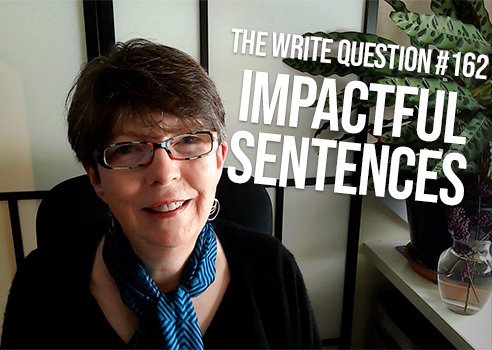Viewing time: 5 mins 3 secs
The Write Question is a weekly video podcast about writing that I started in 2017 and that ran, more or less weekly, until April 2022. This is a republication of issue #162, which describes how to write sentences with more impact. The post first ran on Nov. 6/20.
Transcript:
How can you write sentences with more impact? That’s the topic I’m addressing today in The Write Question. I’m Daphne Gray-Grant, the Publication Coach, still in pandemic mode.
I have a question from Marisa Delgado, an academic based Manchester, England. Here’s what she’s asked by email….
“I would like to be more powerful in my writing — meaning I’d like to write sentences that have more impact. Maybe I have this feeling because I’m not a native speaker, but sometimes I think that important parts of my ideas and arguments are not as powerful as they could be. Does this make any sense to you?”
Thanks for your question, Marisa. I’m glad you told me that English is a second language for you because I’m certain that’s part of the matter.
I’m working hard to improve my French right now and I know how inept and incompetent it makes me feel. My inability to find the French word I want, my fear of grammatical errors, my discomfort with idiom… All of these issues make me a painfully slow speaker, reader and writer in French.
But the way to deal with these challenges — at least when it comes to writing — is to write as quickly as possible and then give yourself LOTS of time for editing later.
Focus on SEPARATING the jobs of writing and editing, when you write you’re putting your ideas into words. Don’t stop to evaluate the quality of those words. Don’t stop to fix errors! Just keep writing. When you write, only write.
Editing is the time when you can correct errors and make your sentences more impactful. I’m going to give you a few tips about adding impact in a moment. But first let me emphasize the urgency of delaying editing. Why?
When you’re writing, you want to be using your creative brain to come up with profound ideas. The impact of each sentence comes not just from how you express it but also from the very idea you’re expressing.
Content is at least as important as form, and perhaps even more so. So, if you’re focusing only on form, you’re missing the biggest opportunity for increasing your impact. Be sure to leave your editing for later, well after you’ve finished writing.
OK, now here are my tips for form. I have two of them aimed squarely at academics.
1 – Check your average sentence length. Many academics don’t pay nearly enough attention to this metric. You want to aim at an average length of 14 to 18 words per sentence. See link in the show notes to a blog post I’ve written about this topic.
Understand that I’m not saying no long sentences should be allowed. Of course, most academic writers will need the occasional 50-word sentence! But you need to balance them out with some much shorter ones. You want your average to be in the 14 to 18 word range.
In English, it sounds particularly elegant and impactful to have a very long sentence followed by a very short one. So, after that 50-word sentence, have a one- to five-word one. Now, some people tell me that such short sentences don’t exist. They’re wrong. See that? I just gave you two two-word sentences in a row: They’re wrong. See that.
2 – Watch out for passive voice. Passive voice occurs when you hide the actor of the sentence. Here’s my favourite example: “Mistakes were made.”
Who made those mistakes? We don’t know. Many academics seem to think their writing sounds more formal or more official with the passive voice, but it doesn’t. It just sounds more boring. Even in scientific writing where you cannot write phrases like, “researchers discovered that…” you CAN say, “the evidence appears to show that…” Always say who is doing the action you are describing. Active sentences are far more impactful for all readers.
Finally, let me wrap up with a quote from the writer and motivational speaker Simon Sinek:
“Genius is in the idea. Impact, however, comes from action.”
Marisa, I know you’re wanting to improve your writing and that is a terrific goal. Just don’t be sure to set yourself up for success by working to separate the jobs of writing and editing. And finally, when you edit, be sure to focus on reducing your sentence length and reducing your use of passive voice.
*
If you’d like to learn more about how to make writing a happier and more rewarding process, check out my latest book Your Happy First Draft. I don’t sell it in bookstores or via Amazon. The only place to buy it is on my website, link on the screen below and in the show notes.
Links
A step by step guide to better sentence length


